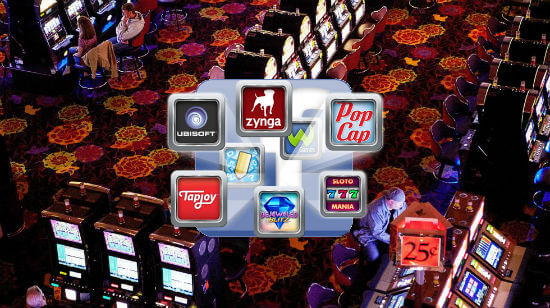If you’re on Facebook, you’ve probably had a friend ask you to “water their Farmville fields” or “give them another Candy Crush Saga life.” But what about if you could ask your friends to give you some more credit for the slots?
With the rise of social networks, the world has seen gaming moving from being for obsessed individuals stuck in front of a slot machine or a computer, to a far more social activity that you can share with your circle of acquaintances.
Sharing your progress with friends, sending requests for help, and continually levelling up with no “end” to the game are all part of this new, hyper-connected gaming environment that’s emerged on social networks including Facebook.
A lot of the social games that have been developed share many features with traditional slots and other casino games. For example, Candy Crush Saga is all about finding matching patterns, just like on the slots.
I won’t believe you if you say you can’t see the similarities between King’s Candy Crush Saga and Betsoft Gaming’s Sugar Pop. Sure, they’re different games on different platforms with different goals, but you match 3 or more sweets and win – they do look incredibly similar.
With so many similarities, it was only a matter of time before social gaming developers decided to try video slots, with the first big announcement coming all the way back in 2012, when Gamesys launched their Bingo & Slots Friendzy app on Facebook.
Since then, many others have been involved, with Paddy Power’s sports betting facilities, Bwin’s tie-up with social gaming company Zynga to offer its Zynga Poker app for real money, and the proliferation of slots, pokers, and bingos in Facebook’s casino games section.
However, despite the similarities between social and casino games, it turns out that social gamers and gamblers are not that similar at all. In fact, “the motivation in social gaming is not sufficient to motivate regular gamblers to participate in these social games” – or, in other words, gamblers don’t want to play because there’s no money to win. Social gamers don’t want to play casino games as they’re more interested in killing a bit of time. People play for very different reasons.
So it’s no surprise that some big companies are starting to cut their losses and pull out of the casino social gambling market. The trailblazing Bingo & Slots Friendzy was taken off Facebook on 4 June 2014, with less than a week’s notice to players, and Zynga and Bwin’s project has earned so little money that both firms prefer not to mention it at all.
It seems that it’s very difficult to get social players to start playing for real money if they don’t already want to. People have very different reasons for playing, which is fine. The point for casinos and games developers to remember is to produce something that meets the needs and demands of their players.
Because, at the end of the day, we want to have fun spinning the reels. Slots players are a fussy lot, demanding a lot from their games, which is only fair: if you’re putting money in, you want to make sure you have the best possible experience.
Perhaps, then, it’s better if developers focus on the basics, which means top-notch graphics, engaging (and not irritating!) audio, and perhaps most importantly, big payouts. Leave the social gaming to the social gamers – we’ll send “requests” to share our happiness with our friends when we’re ready.




















